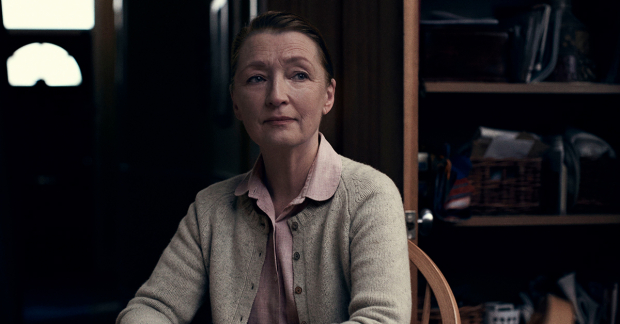Review: Talking Heads Live (Bridge Theatre)
Alan Bennett’s monologues return in a new socially distanced season

© Zac Nicholson
Since they first appeared in 1988, Alan Bennett's Talking Heads have become so familiar – so celebrated, so studied – that it's easy to lose sight of just how radical they were and are. They spin their stories and their characters out of a place that is both entirely believable and not quite real, delivering their revelations and their bleak truths with the sleight of hand of a thriller or a ghost story.
Because they set one character alone to conjure a world of multitudes, they are perfect for the Bridge Theatre's season in these coronavirus-affected times: although the seating capacity is reduced to 250 (or less if all the tickets are not sold) and walking into the socially-distanced theatre with its spaced seats feels a little lonely, once the lights fall and the performance is underway, the vivid sense of an entire world is quickly in play. The monologues were wonderful on TV but they suit live performance, drawing an intent audience into their ambit with the power of a whispered confession.
In fact, watching these perfectly-pitched performances, directed with love and skill, and cleverly staged on Bunny Christie's set of simple screens, animated by Luke Halls' video projections, Jon Clark's lighting, Gareth Fry's sound design and George Fenton's music, feels safer and considerably more entertaining than the train journey to reach the theatre. Or sitting on an airplane for that matter.
The cast and the directors are the same as in the recent revivals on the BBC. But the effect is somewhat different, not least because they are carefully paired to make an event of just over an hour, casting light and shade, allowing us to admire the way Bennett flexes different muscles while all the time remaining true to his own idiosyncratic vision of the lost, lonely and unhappy. How anyone describes these plays as comedies is a mystery.
The Outside Dog, written in 1998, is a case in point. There may be the odd joke in Marjorie's descriptions of her obsessive cleaning and her description of her slaughterman husband and his family. "When it comes to evolution, they are hardly above pigsty level." But any laughter dries in the throat as she grapples with her dawning fears that her husband may be a killer. As directed by Nadia Fall, Rochenda Sandall portrays her as superficially tough, all bluster and defiance. But the fear in her eyes is unmistakable; in the closing scenes the full realisation of her plight is terrifying to us and to her. It's a shattering portrayal of domestic abuse.
The play is twinned with the much more gentle The Hand of God, in which Kristin Scott Thomas plays Celia, the refined antique dealer whose sense of her own superiority blinds her to her own greed and also to the true value of what she sees with her own eyes. Directed by Jonathan Kent, the play and the production are a lesson in nuance; Scott Thomas is astonishingly quiet and still, suggesting feeling with a twitch of her floral skirt or a gathering around her of her nice, cashmere cardigan, lending Celia just enough pathos to make us care about her fate.
In The Shrine, written last year, Monica Dolan brings similar insight to Lorna, who erects a makeshift memorial on the site of her husband Clifford's death in a motorcycle accident. As she visits the spot, she discovers a kind of comfort in bearing witness to his death but also a searing realisation that the man she thought she knew had another life, hidden from her. "I wish I'd known, or I wish I hadn't," she says wistfully, and Dolan magnificently finds all the notes of love and regret in another wasted life.
But it's Bed Among the Lentils that emerges in as a masterpiece. Directed by Nicholas Hytner (who also directs The Shrine), this monologue from vicar's wife Susan, married to the ghastly Geoffrey, hits the perfect Bennettian balance between humour – "Geoffrey's bad enough but I'm glad I wasn't married to Jesus" – a fierce interrogation of the nature of Christian charity, and a deep, cutting sorrow.
Lesley Manville is extraordinary, conjuring both Susan's utter loneliness and the transforming nature of her encounter with "the exquisitely delicate and polite" Ramesh Ramesh, the local grocer from whom she buys her secret sherry. The loveliest of smiles passes across her face as she remembers their bed among the lentils, his kindness and his concern. Her final revelation that even her acknowledgement of her alcoholism is being used by Geoffrey as a proof of his goodness – "as if love is some all-purpose antibiotic" – goes beyond bittersweet to tragic. The writing has the same finesse as the performance.












